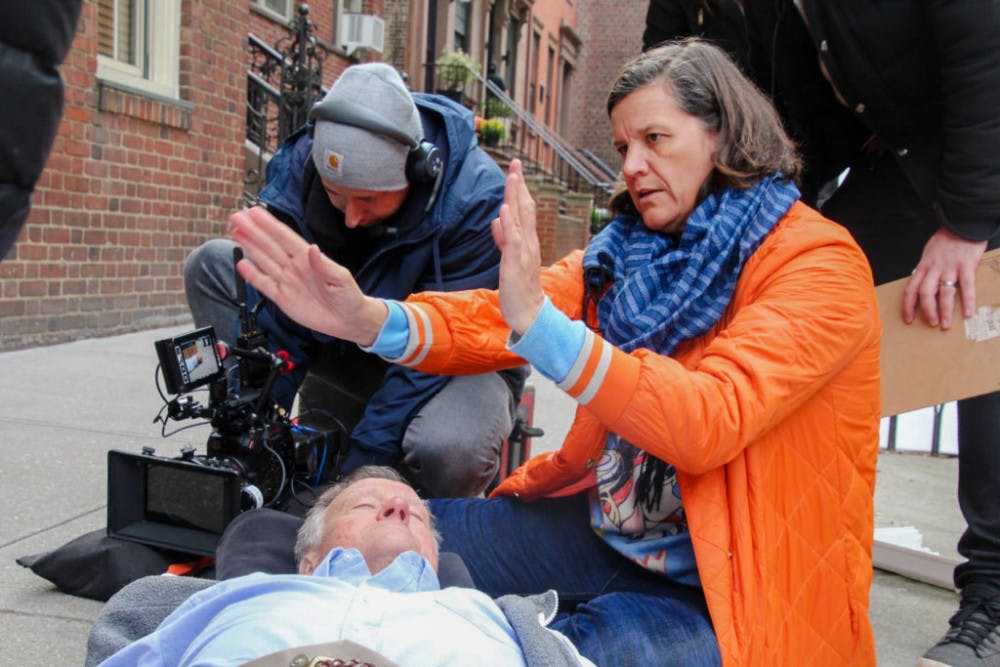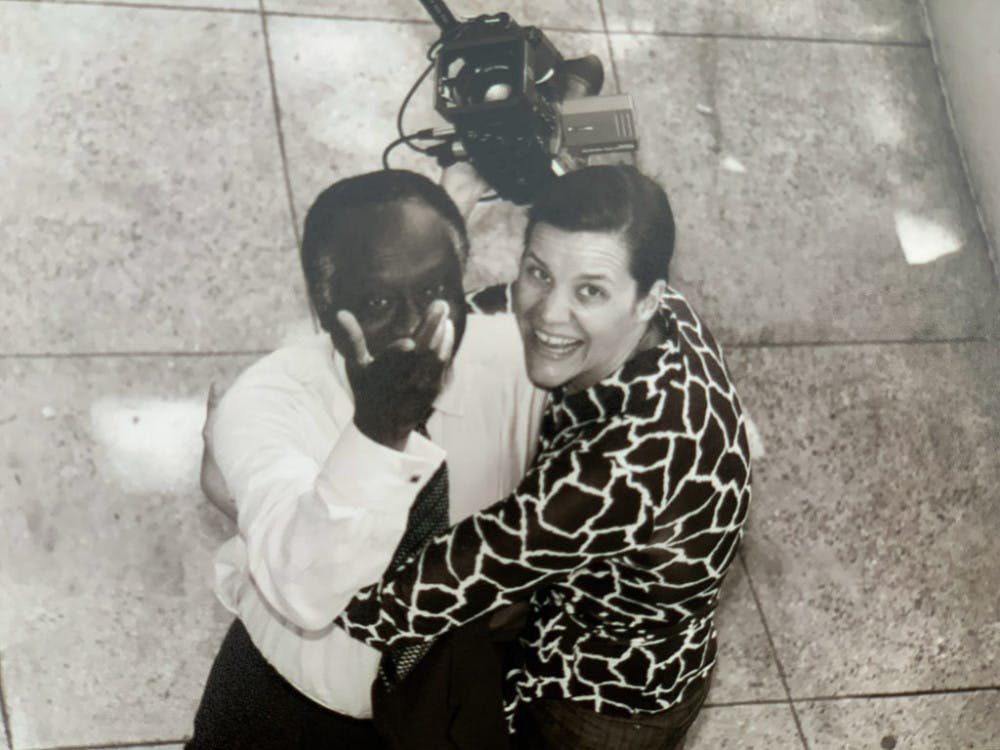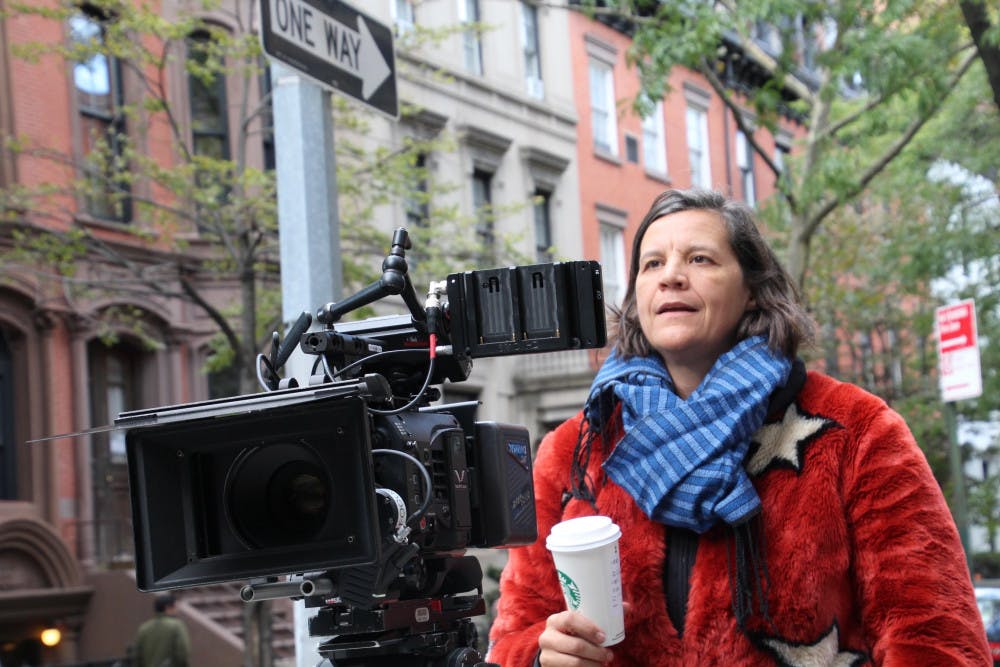When an 18-year-old Kirsten Johnson ’87 arrived at Brown in the fall of 1983, she had never even picked up a film camera, let alone imagined a future where she would travel the world for her career as a filmmaker. Over 30 years later, with an abundance of cinematography and directing credits under her belt, this is her reality.
Latest work
Johnson’s latest film, “Dick Johnson Is Dead,” a documentary focusing on her father Richard as he suffers from dementia, was released on Netflix Oct. 2. It premiered at the 2020 Sundance Film Festival and won the Special Jury Award for Innovation in Non-fiction Storytelling.
Not subscribing to the typical structure of a biographical film, “Dick Johnson Is Dead” finds humor in the imagined scenarios of life and death.
“With ‘Dick Johnson Is Dead’ we sort of created our own creative process. We said, ‘Okay, we’re going to try and make an impossible movie,’” Johnson said. “I’m trying to create a movie that will keep my father alive forever, trying to make a funny film about dementia. And I’m going to fail.”
Johnson wanted to create a humorous film that detailed the potential ways her father — who is featured in the film — could die, including imagined scenarios in which he falls down the stairs or is violently struck in the neck. Her father even goes as far as to act out his own funeral.
[caption id="" align="aligncenter" width="650"]

“This is an experiment in raging against death. The few rules I created for myself were that I wanted this process to be a back and forth: between me and my dad and with all of the people I’m working with.”
Although the film has received critical acclaim, the time Johnson has spent with her father making the film as his dementia progressed is what she has found to be the most special. When she first pitched the idea of the film, her father laughed. Now, he watches it repeatedly — using it as a means to remember people and memories through the authentic home movies and pictures featured in the documentary.
“It's scary to risk the reputation of his life. I thought, ‘I’m about to create a crazy movie with my dad, what if it’s not funny? What if it’s stupid?’ But, it was about having a record of him. My memory of him won’t be destroyed,” Johnson told The Herald.
Time at Brown
Growing up in Seattle in a religious Seventh Day Adventist home, Johnson arrived on College Hill excited and ready to make the most of an entirely new experience. She oftentimes found herself realizing she couldn’t do all that she wished — exercising, socializing, painting all night for her classes and exploring her new environment. Arriving at Brown, she said, felt like arriving at a “buffet of food” — there were just so many things to try.
Johnson quickly realized that it was her peers and activities outside of the classroom that shaped her learning more than anything else.
During her junior year, Johnson joined the efforts of Students Against Apartheid, driven by a newfound interest in social justice that had developed over the previous two years. Johnson and her colleagues urged Brown to divest their money in South Africa due to the Apartheid rule. Through this work, she was able to connect with people who understood what it meant to live under a repressive government and experience the impacts of racism.
This experience, coupled with one of her greatest influences — the late Associate Professor of Africana Studies and Portuguese and Brazilian Studies Anani Dzidzienyo and his class on Afro-Brazillian history — opened her eyes to a world that was larger and more attainable than she had previously imagined.

Career after Brown
Graduating with a degree in fine arts and literature and society at the age of 22, Johnson, who hoped to document the lived experiences of others, failed to obtain the highly coveted Thomas J. Watson Fellowship, which would have provided funding for post-graduate work.
But in order to pursue her dream, she worked as a driver for A.B. Munroe Dairy in Pawtucket, and slowly but surely saved enough money to travel to Senegal to begin work on her first film.
Johnson hit the ground running, interviewing Senegalese citizens who fought in World War I on behalf of the French. She completed hours of work, but never compiled her research into a film.
But her Senegalese friends encouraged her to enroll in La Fémis, the French national film school, where she created her first two fictional short films, “Foreign Body” and “Le pari de Bintou.” While “Foreign Body” discussed the impact of a pandemic, “Le pari de Bintou” focused on the trauma of Malayan girls from female genital mutilation.
These films marked the start of her cinematic career.
Looking back, Johnson recalled an instance when she felt her career and her experience at Brown intertwined.
“I was on the set of a Brazilian film, speaking in Portuguese to an Afro-Brazilian man, and I was like, ‘Oh my god, I’ve done it! I’ve travelled, I’m in film, I’ve learned languages,’” Johnson said, adding that this experience had also given her the opportunity to continue to critically consider racism. “At Brown, I thought I could do it all in two years, but it turned out to be the work of my lifetime.”
Johnson’s first feature length documentary, “Cameraperson,” which premiered at the 2016 Sundance Film Festival to critical acclaim, documented her career as cinematographer over the course of many years and through a plethora of countries. The autobiographical film holds a 99-percent rating on Rotten Tomatoes based on 105 reviews and received the top prize at the Sheffield International Documentary Festival.
“We all think about what will be revealed when we speak, what it will say to other people about us. When you’re working on a film, you’re grappling with your own fear, shame and ambition," Johnson explained. "What was so amazing about the process was that I stopped believing that any audience would see it and thought of it as a way to come to terms with myself as a cameraperson,” she said of the project.
Now, Johnson is preparing for her new documentary, which follows other cinematographers around the world. As a member of the Academy of Motion Picture Arts and Sciences, she is grateful for her formative years at Brown and the trust she has fostered in herself.
“Trust your own instincts about the strange combination of things that matter to you and be kind to yourself. Don’t beat yourself up too much,” she said.
“It’s great to not know what your life is going to become.”

Rebecca Carcieri is an arts & culture editor. She is a senior from Warwick, Rhode Island studying political science.





